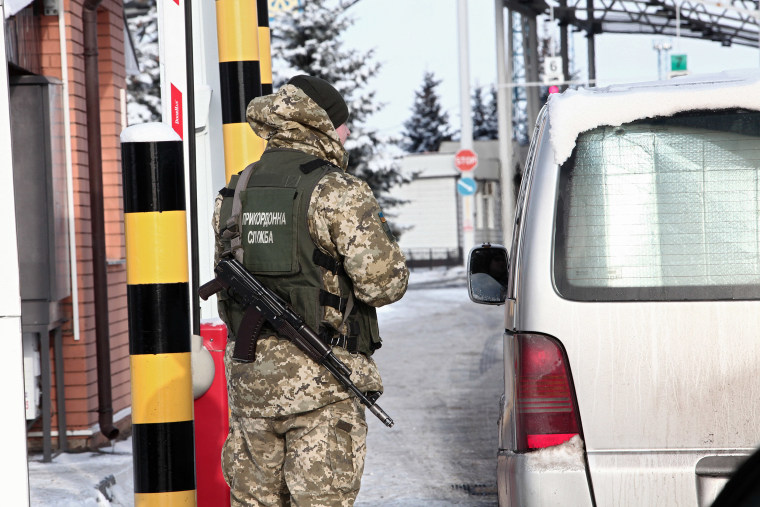Russian men between the ages of 16 and 60 have been barred from entering Ukraine after long-simmering tensions between the countries escalated into a clash on the Black Sea.
Ukrainian President Petro Poroshenko tweeted Friday that restrictions on Russian nationals were taken in order to prevent the formation of "private armies which in reality are representatives of Russian armed forces."
Russian Foreign Ministry spokeswoman Maria Zakharova told reporters Friday that Moscow would not reciprocate and impose similar restrictions on Ukrainian men.
Russian ships opened fire on and seized three Ukrainian vessels and 24 crew members in the Sea of Azov off the coast of Crimea on Sunday. Ukraine says the attack occurred in international waters.
Amid fears of a Russian invasion, Poroshenko introduced martial law on Tuesday for up 30 days in parts of the country deemed most vulnerable to a potential attack.
Martial law allows the president to impose restrictions, including limits on the movement of foreigners.
It also means Poroshenko can ban peaceful public protests and regulate the media. No elections can be held when it martial law is in place, but Poroshenko insists Ukrainians will be be able to vote as planned in March.
SIGN UP FOR NBC BREAKING NEWS EMAILS
Jack Watling, a research fellow at the London-based Royal United Services Institute think tank, said Poroshenko's fears were well-founded. He said Russia has stationed units on Ukrainian's eastern border that specialize in deep reconnaissance and penetration.
But Mark Galeotti, a senior non-resident fellow at the Institute of International Relations Prague, described the measure targeting Russian men as "a depressing move based in politics not security." He suggested that "agents of the Kremlin operating in Ukraine already often have Ukrainian documents, will switch to other cover identities or be women.”
The Kremlin often accuses Ukraine's government of stirring up anti-Russian sentiment.
Mathieu Boulegue, a research fellow with Russia and Eurasia program at London's Chatham House think tank, said Poroshenko’s move appeared to be “an attention-seeking reaction” that is likely to antagonize Moscow even further and play badly with the international community.
It’s not so much about “curbing the threat” as it is to show the Ukrainian public that the president is doing something about the escalation, he added.
The seizure of Ukrainian ships on Sunday was the latest rift between the neighbors. Tensions were already high after the 2014 annexation of Crimea and the ongoing armed conflict between government forces and Russia-backed separatists in eastern Ukraine.
When Russia and Ukraine were relatively friendly, they shared the Sea of Azov and the Kerch Strait as part of a 2003 agreement.
But Moscow's annexation of Crimea gave it control of not just one but both sides of the strait. Most countries in the world, including the U.S. and almost all of Europe, say Russia's annexation of Crimea is an illegal occupation.
Although the 2003 agreement still stands in theory, Russia now demands that all vessels, including those from Ukraine, to request permission before they pass through.
In May, it opened the $3.69 billion Crimea Bridge, cementing its grip on this crucial bottleneck. Independent observers have pointed out that the bridge's span is lower than international standards, putting a permanent cap on the size of ship able to enter the Azov.
The move has caused huge delays in recent months, leading to claims Russia is trying to blockade Ukraine's ports and transform the Azov into a de facto Russian lake.
Some Western critics say this is all part of the Kremlin's tactic of "creeping annexation," a ploy to subtly recoup Soviet-era territory.
Ukraine is demanding that Russia release crew members of the seized ships. On Friday, the Tass news agency reported that the commanders of the three Ukrainian vessels were being transferred to Moscow for interrogation. The other 21 remained in custody in Crimea.
Poroshenko has also called on NATO to increase its presence in the Sea of Azov and encouraged Kiev’s European allies to impose tougher sanctions on Russian President Vladimir Putin’s government. Both of those pleas have so far fallen on deaf ears.



